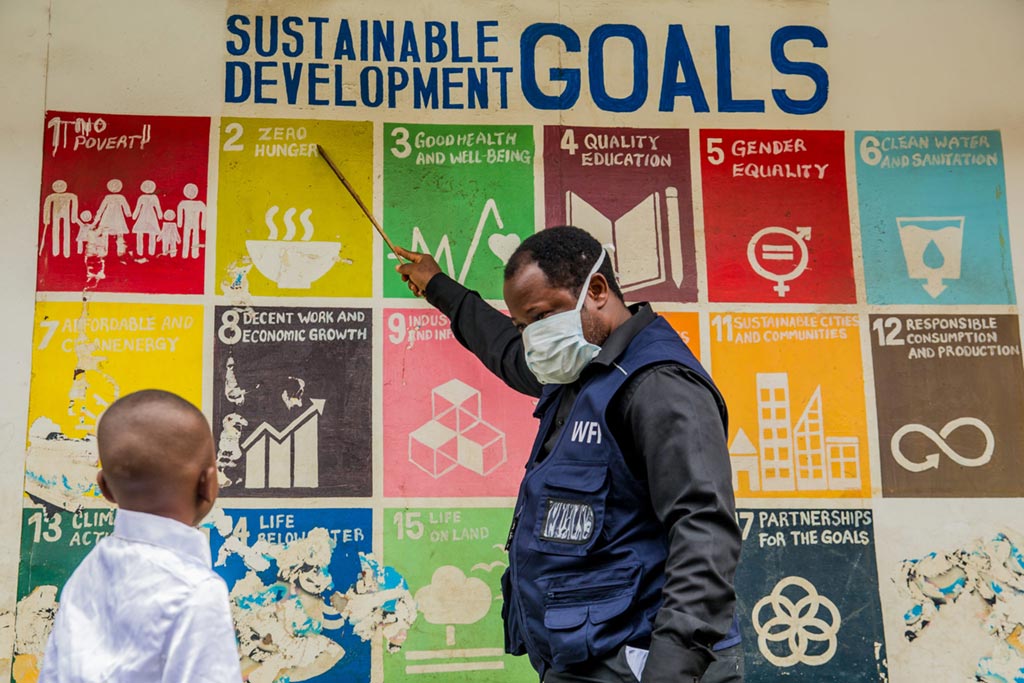
A World Food Programme (WFP) staff member teaches a pupil about the Sustainable Development Goals amidst the COVID-19 pandemic at a distribution center for the National Home Grown School Feeding Programme in Adekunle Anglican Primary School, Makoko, Lagos, Nigeria. (Photo: Damilola Onafuwa/WFP)
Embracing the challenge to support one of CCHN’s Strategic Partners in examining the Global Access situation in the context of COVID-19, the CCHN was trusted by the World Food Programme to facilitate and moderate the Global Access Discussion. This series of panel discussions and staff exchanges was held on 10 August 2020. The facilitation format was based on our experiences through the series of Peer Circle discussions and online Monthly Forums on Humanitarian Responses to the COVID-19, organized from May to July 2020.
This advisory support was a great opportunity for CCHN to support a partner organization while getting a chance to engage with a community of humanitarians working and focused on humanitarian access and operational challenges in a variety of environments. After some preliminary work with the organizers of the WFP, we aimed to address the question of whether and how the COVID-19 has impacted humanitarian access and operations. Additionally, we used the forum for teams and individuals to exchange thoughts and strategies that have worked and could become best practices for other contexts.
Collecting Insights from External Partners, Research and Policy Institutions
The discussion was opened with introductory remarks from David Kaatrud, WFP Director of Programme – Humanitarian & Development Division, HQ Rome. “This particular event is convened by the WFP Technical Access Cell under the Programme Policy Division, with the support and facilitation from CCHN. We want to substantiate this mechanism within the WFP to work fully and properly, as we go forward grappling with the COVID-19 challenges.”
The first panel was comprised of external speakers offering a more global vision based on their experience and research, namely OCHA, ACAPS and Humanitarian Advisory Group. One of our Community Members, Benedetta de Alessi, offered valuable insights from her role as OCHA Access Focal Point, Regional Office for Eastern and Southern Africa. “By sharing OCHA’s global survey on Trends of Access with WFP colleagues, hopefully, there can be a bigger picture understanding on the evolution of access in the context of COVID-19 as well as the types of access constraints, their impact and collective strategies for mitigation,” described Benedetta de Alessi.
Providing Samples of Regional Best Practices within an Internal Discussion
Following some exchanges with the global panel, we transitioned into a WFP internal discussion with four speakers representing different roles and regional contexts within WFP who gave the participants some background on what they are dealing with on the ground with a real focus on finding solutions. “The main objective of WFP’s Global Access Discussion was to exchange and share experiences on access constraints during the COVID-19 pandemic, were met with a broad participation of WFP staff from around the globe, and in various types of operations. This session, largely due to the moderation and facilitation of CCHN, has brought a lot of interest from the field in having a platform to discuss access related constraints,” explained Philippe Kadima, WFP Humanitarian Access Officer, Rome, Italy.
There was a lively and interactive exchange with participants. While Will Harper, CCHN Negotiation Support Specialist – Africa moderated the exchanges, the CCHN team worked behind the scenes to filter and organize comments and questions to ensure voices were and perspectives from across the globe were heard.
“I was interested in hearing about access to, and release from healthcare services, especially for humanitarian personnel. In my observation in a number of countries, we are often engaged in very challenging negotiations with health authorities to ensure that humanitarian staff is not automatically institutionalized, as this can impact our ability to deliver, and may create distrust from staff and families. It’s been great to hear from colleagues who have any tips for negotiating with doctors and health authorities; not usually a field that we are familiar with. Building our own capacity to conduct such negotiations will likely be essential going forward.” said Vincent Van Belle, WFP Head of Security, Damascus, Syria.
